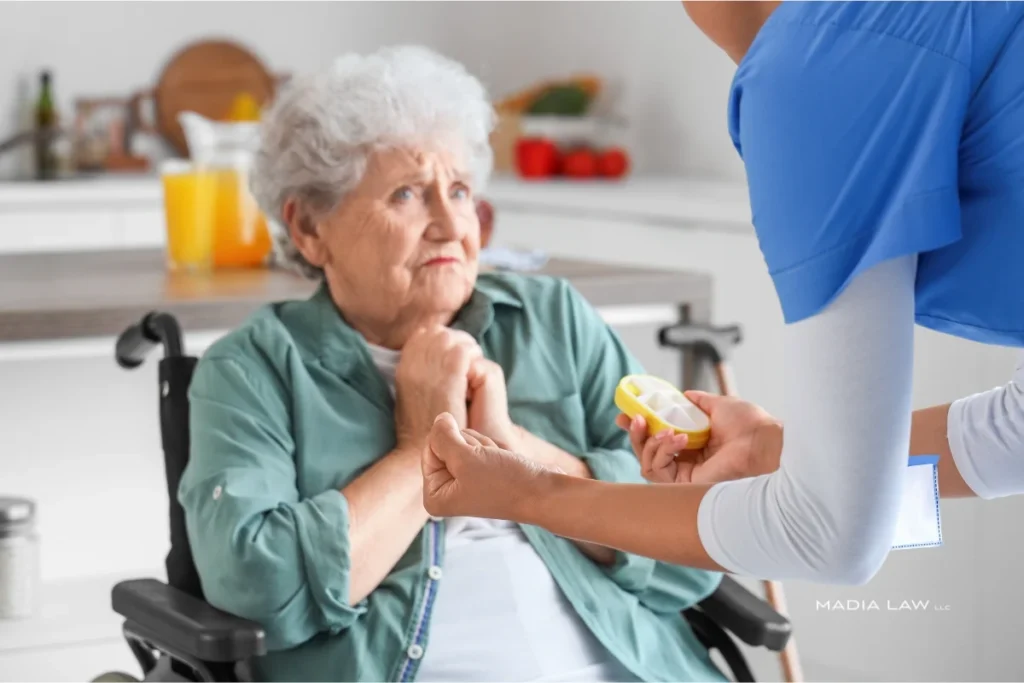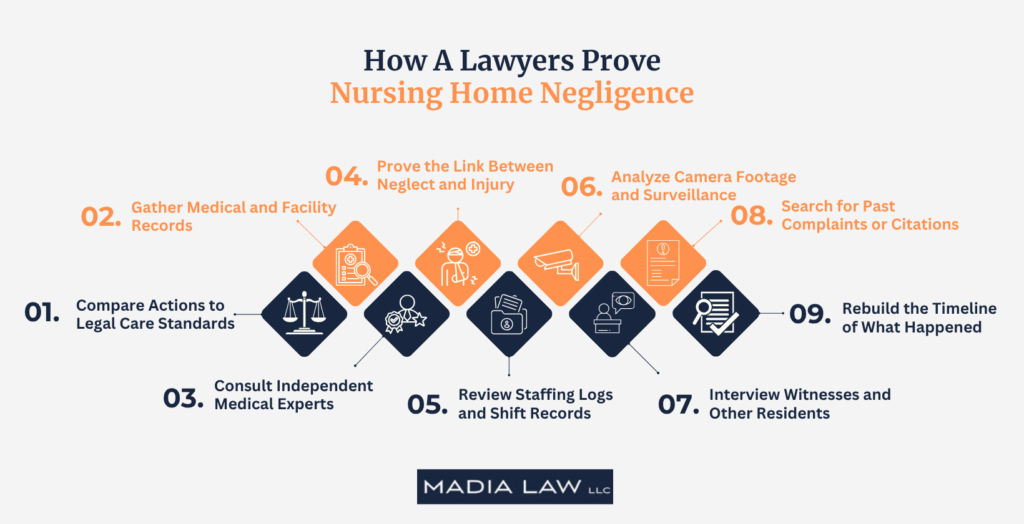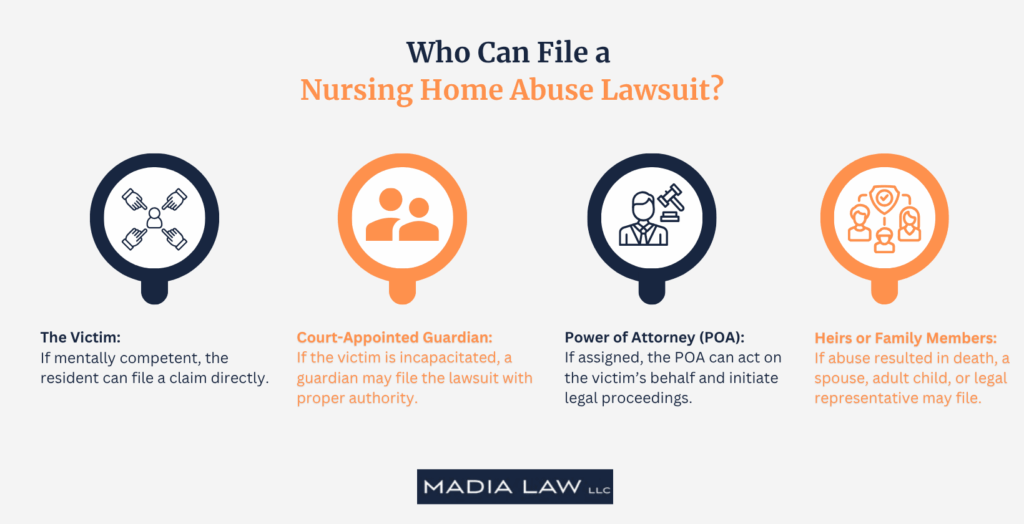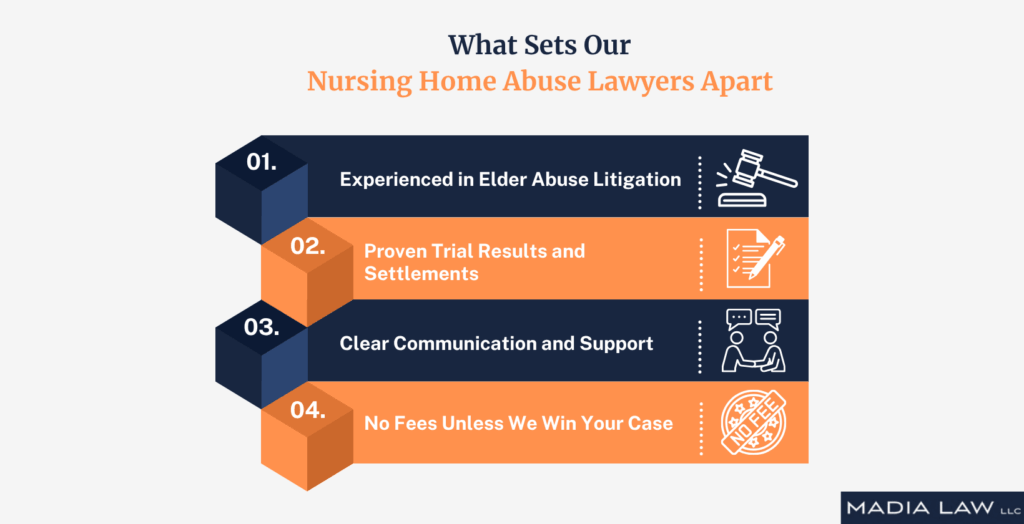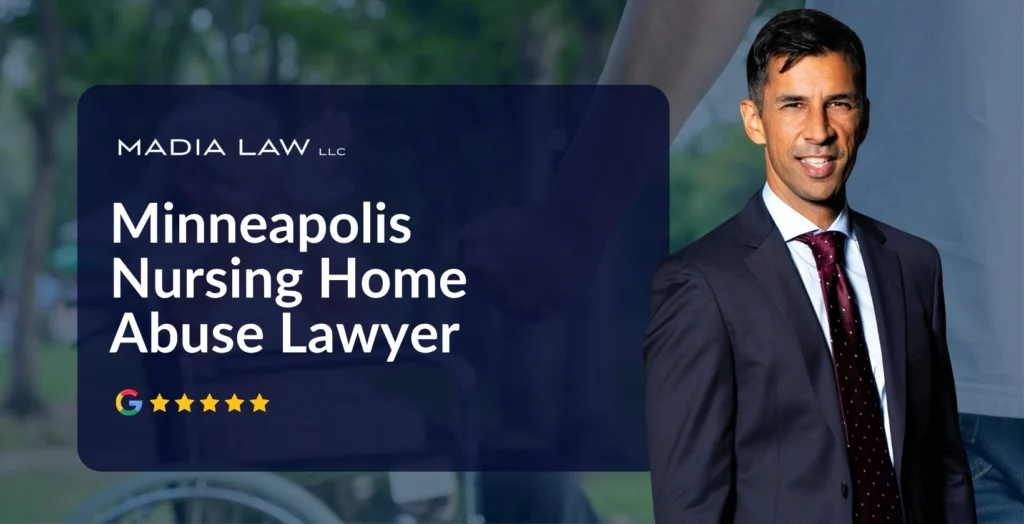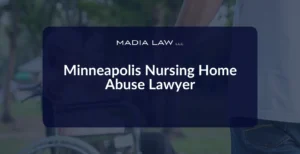
Imagine visiting your loved one in a nursing home and finding unexplained bruises, bedsores, sudden weight loss, or emotional withdrawal. You trusted that facility to care for your parent or spouse, but instead, you are left feeling betrayed, angry, and unsure where to turn.
At Madia Law LLC, we take those concerns seriously because this is not just about the merits of filing a legal case. It is about upholding what is morally right to protect your loved one, stop the abuse, and hold negligent facilities fully accountable under Minnesota law.
Our Minneapolis-based trial lawyers focus exclusively on cases involving nursing home neglect and elder abuse, and we have seen firsthand how quickly things can go wrong when Minnesota corporations and facilities cut corners or put profits before people.
When you contact us, we will act fast to tilt things in your favor. We gather evidence, preserve records, and move quickly to prevent further harm. We do not charge anything upfront, and you owe us nothing unless we win your case.
Call us now at 612-349-2729 for a free consultation. We will listen to your story, answer your questions honestly, and explain exactly how we can help, without pressure, and without delay.
What Does a Minneapolis Nursing Home Abuse Lawyer Do?
A Minneapolis nursing home abuse lawyer protects your loved one by taking fast legal action, gathering evidence, and forcing accountability when facilities fail to provide safe care. We investigate suspected neglect, uncover what went wrong, and build legal cases that demand real consequences for harmful actions.
We do not wait for nursing homes to act; we take action first. From securing medical records to filing legal claims, our job is to guide your family through every step while protecting your loved one from further harm.
For a legal consultation with a Personal Injury lawyer serving Minneapolis, call 612-349-2729
Build Legal Cases That Hold the Facility Legally Responsible
We start by collecting your loved one’s medical charts, treatment notes, and internal records. We review them for gaps in care, inconsistencies, or warning signs that may indicate abuse has occurred. Our team visits the facility, interviews staff, and gathers video or photo evidence if available. Every piece of evidence is preserved under legal chain-of-custody rules to ensure it holds up in court. This groundwork is essential for building a strong claim.
Minneapolis Nursing Home Abuse Lawyer Near Me 612-349-2729
Spot Hidden Patterns of Negligence That Facilities Try to Hide
Most elder abuse is not just a one-time event, but is part of an ongoing and bigger problem. We dig deep into staff schedules, complaint reports, past inspections, and incident logs to uncover repeat violations. When neglect follows a pattern, it shows that the facility failed to fix a known danger. That kind of proof gives us powerful leverage to demand change and secure compensation.
Intervene Before Facilities Destroy Records or Shift Blame
Nursing homes often go on the defensive quickly, erasing evidence or pressuring staff to stay quiet. We intervene to stop that from happening. As soon as you hire us, we send a legal notice to preserve all records, isolate witnesses, and secure critical documents. Acting early gives your family the upper hand and protects your loved one’s rights before the facility can cover its tracks.
File the Abuse Claim and Lead All Legal Communication
Once we have gathered sufficient evidence, we file a formal claim with the nursing home and their insurance provider. From there, we handle every call, letter, and negotiation. You do not need to deal directly with their lawyers or their adjusters, who may take an aggressive tone and try to intimidate you or get you to twist your words. Most cases do not eventually go to trial, but we build every case as if it will. That’s how we secure stronger settlements without delay.
Make the Legal Process Clear and Manageable for You
We know this process can feel overwhelming, especially when you are already caring for someone you love deeply who has been hurt. That is why we break down each step in plain English, from paperwork to court dates. You will get updates you can comprehend, honest answers to your questions, and full control over how your case moves forward. No confusion, no surprises.
Help Prevent Further Harm to Your Loved One and Others
A nursing home abuse claim does not just help your family; it can protect other residents, too. Oftentimes, legal action forces state investigators to intervene, sparks staff changes, and prompts policy updates inside the facility. Taking action now can stop the abuse from happening again, today and tomorrow.
Click to contact our personal injury lawyers today
How Our Lawyers Prove Nursing Home Negligence in Minneapolis
To win a nursing home abuse case, we must prove that the facility failed in its legal duty and that this failure directly harmed your loved one. Our experienced lawyers do not rely on assumptions. We dig deeper and work harder to prove negligence using evidence, expert insight, and a clear timeline of what went wrong.
Most families lack access to the records, knowledge, or legal authority to uncover the truth on their own. That is where our Minneapolis nursing home abuse attorneys come in. We handle the investigation from start to finish, so you can focus wholly on your loved one’s care, not running in circles chasing paperwork.
Each of these steps enables us to construct a legally sound case based on evidence, not guesswork. Without these, it becomes nearly impossible to prove a nursing home abuse case successfully; with these, we build a claim that is hard to ignore, and even harder to deny.
Complete a Case Evaluation form now
How We Resolve Nursing Home Abuse Lawsuits: Settlements & Trials
Winning a nursing home abuse case requires more than proving negligence. Once we establish that a facility caused harm, we guide your family through one of two legal paths: settlement or trial, based on what best protects your loved one and meets your goals.
At Madia Law, we do not push the Minnesota families we represent toward quick outcomes or risky court battles. We prepare every case for the possibility of any scenario. Being ready for anything and everything is how we earn accountability and meaningful compensation for our clients, as well as lasting change inside the facility.
| Settlement Path | Trial Path |
|---|---|
| Uses strong evidence to push the facility to settle early | Builds a courtroom case with depositions and sworn testimony |
| Handles all insurer negotiations to reach a fair financial resolution | Presents evidence to a jury, supported by medical experts and documentation |
| Secures compensation quickly and avoids lengthy court delays | Cross-examines staff under oath to reveal hidden misconduct |
| Protects families from trial stress while holding the facility accountable | Fights for full compensation through a jury verdict when needed |
| Ideal when speed and privacy matter most | Best when the injury is severe or the facility refuses to settle fairly |
We tailor your legal strategy based on what matters most to you, whether it be a fast resolution, a public record, or the largest possible recovery. You stay in control, and we provide the legal firepower.
We are not just negotiators. We are seasoned trial lawyers with a long history of success for clients in Minnesota county courts. We fastidiously prepare to win from day one because we know that is what gets results that matter, in or out of court.
Types of Nursing Home Abuse Cases We Handle in Minnesota
Nursing home abuse takes many forms, and each one leaves a different kind of harm. Our Minneapolis-based nursing home attorneys handle all major types of elder abuse recognized under Minnesota and federal law. Whether the injury is physical, emotional, or financial, our job is to hold the facility accountable and protect your family.
Below are the 7 types of nursing home abuse cases we investigate and pursue across Minnesota:
- Sexual Abuse: When nursing home residents are touched, exposed, or violated without consent, often by caregivers or staff, it is abuse. We pursue justice in both civil and criminal courts.
- Physical Abuse: Unexplained bruises, fractures, or restraint marks signal assault. We investigate and file claims against facilities that fail to prevent bodily harm.
- Mental Abuse: Verbal threats, isolation, and humiliation cause real psychological harm. We gather proof and expose repeated mistreatment.
- Weight Loss: Sudden weight loss often signals missed meals or dehydration. We trace it back to staff failures or poor oversight.
- Wrongful Death: If abuse or neglect led to death, we file claims for justice, compensation, and policy change.
- Medication Errors: Missed doses, overdoses, or drug mix-ups put lives at risk. We hold facilities liable for unsafe medical practices.
- Financial Abuse: Theft, check fraud, or coerced transfers by staff or others are illegal. We recover stolen assets and stop future abuse.
How Our Lawyers Maximize Compensation for Nursing Home Abuse Victims
When your loved one suffers abuse in a nursing home, compensation due is not just about money—it is about justice, dignity, and recovery. We build every case to recover the full value of what was lost: physically, emotionally, and financially.
Our Minneapolis nursing home abuse lawyers use a detailed, proven, evidence-driven process to calculate damages and pursue the highest compensation available under Minnesota law.
Medical and Relocation Expenses
We claim every cost caused by the abuse, including:
- Emergency room and hospital bills
- Long-term rehabilitation or therapy
- Follow-up medical visits and procedures
- Relocation to a safer nursing facility
- Ambulance and transportation services
Our team reviews billing records, treatment plans, and facility transfers to prove each cost and demand repayment in full.
Pain, Suffering, and Emotional Distress
Non-economic damages cover what cannot be measured by receipts: anxiety, trauma, humiliation, and emotional decline. These effects often last longer than physical injuries.
We work with trauma counselors and psychologists to document the impact and explain it clearly to Minnesota insurers or juries, because emotional harm deserves full recognition.
Punitive Damages for Misconduct
When abuse is the result of reckless, repeated, or intentional behavior, Minnesota law allows for punitive damages. These penalties are meant to punish, not just repay.
We gather evidence of past violations, ignored complaints, and staff misconduct to prove when a facility knew better and failed to act.
Factors That Affect Settlement Value
No two cases are the same, but we evaluate these factors early to estimate your case value:
- Severity and permanence of the injuries
- Quality of documentation and witness testimony
- History of prior violations at the facility
- Proof directly linking abuse to the harm
- Willingness of the nursing home to cooperate or settle
We evaluate these factors early so we can guide your family with realistic expectations and a strategy that fits your specific circumstances and goals.
Who Can File a Lawsuit for Nursing Home Abuse?
Not everyone has the legal authority to file a nursing home abuse lawsuit in Minnesota. State law allows only specific individuals, those directly affected or legally appointed, to take legal action. Our attorneys at Madia Law help families determine who can file and ensure the claim is brought by the right person, in the right way.
Understanding Your Legal Rights Under Minnesota and Federal Laws
Many families do not realize nursing home residents are protected by law until that protection is violated. Our lawyers help you understand the legal rights your loved one has under both federal and Minnesota law. We identify violations, explain your legal options, and take swift action to hold the facility accountable.
Federal Rights Under the Nursing Home Reform Act
Federal law guarantees every nursing home resident the right to safety, dignity, and proper care. The Nursing Home Reform Act protects:
- The right to be free from abuse or neglect
- The right to make personal decisions about daily life
- The right to receive visitors and file complaints without retaliation
If a facility fails to meet these standards, we use these federal protections to build your case and prove liability.
Minnesota Nursing Home Care Standards
Minnesota law adds another layer of protection. These state regulations cover:
- Minimum staffing requirements
- Resident safety protocols
- Facility inspection and reporting duties
When nursing homes violate these rules, especially in repeated or serious ways, we classify it as a statutory breach. That gives your case an even stronger legal foundation.
Legal Authority of Guardians and Power of Attorney
If your loved one cannot speak or act on their own, someone with legal authority must step in. That includes:
- A court-appointed guardian
- Someone with a valid Power of Attorney (POA)
We confirm who holds legal standing and ensure all filings and communications with the MN county courts are done properly, so the claim is not delayed or challenged.
Minnesota’s Statute of Limitations for Nursing Home Abuse
In Minnesota, most nursing home abuse claims must be filed within 2 to 3 years, but when that clock starts depends on the type of abuse and when it was discovered.
Delaying action can cause your case validity to expire. That is why it is critical to speak with a lawyer early, while evidence is fresh and your legal options are still open.
What to Do If You Suspect or Witness Nursing Home Abuse in Minneapolis
If on your nursing home visit you notice something off—unexplained injuries, sudden changes in behavior, or poor living conditions—do not ignore it. Acting quickly can protect your loved one and prevent further harm. It also strengthens any legal case that may follow.
How to Report Abuse to State Authorities
In Minnesota, you can report suspected elder abuse to the Minnesota Adult Abuse Reporting Center (MAARC) at 1-844-880-1574, available 24/7.
You can also contact the Ombudsman for Long-Term Care, who investigates complaints and advocates for residents. If someone is in immediate danger, call 911 first, then file the report with MAARC or the ombudsman.
Reports are confidential, and you are protected by law when reporting in good faith.
What Evidence to Document
Gathering proof is critical. Accurate, well-documented details give your case credibility and urgency. Start collecting:
- Date-stamped photos of injuries or unsafe conditions
- Notes with names, times, and what was observed
- Copies of medical records or care instructions
- Names of staff, witnesses, or visitors who saw the incident
- Messages from the facility (emails, texts, voicemails)
Our legal team uses this documentation to prove what happened and hold the facility legally accountable.
When to Contact a Lawyer
Reach out to a Minneapolis nursing home abuse lawyer as soon as any red flags appear. You should not wait for confirmation or formal findings to proceed.
Contact us immediately if:
- You are being denied access to your loved one
- You notice physical injuries or unexplained behavioral shifts
- Staff become hostile or evasive when questioned
- You fear retaliation for raising concerns
- Your loved one has passed away under suspicious circumstances
The earlier we step in, the more we can preserve, protect, and prove. Let our Minneapolis nursing home abuse attorneys handle the legal response, so your family can focus on safety and healing.
How Long Does a Nursing Home Lawsuit Take in Minnesota?
Most nursing home abuse lawsuits in Minnesota take 12 to 24 months from investigation to final resolution. Some settle in a matter of months, especially if the evidence is clear and the facility cooperates. Others take longer, particularly if the case goes to trial or the defendant delays.
Hiring an experienced Minneapolis trial lawyer early can significantly reduce the likelihood of delays. At Madia Law, we begin preserving evidence immediately, file claims without hesitation, and apply consistent legal pressure to advance the case and reduce the lawsuit timeline.
Signs of Nursing Home Abuse You Should Never Ignore
Early warning signs of nursing home abuse often look like normal aging, but they are not. Families sometimes overlook red flags until it is too late. Acting early can stop the abuse, protect your loved one, and preserve your legal rights. We help families in Minnesota recognize the signs and take immediate legal action.
Here are 10 signs of nursing home abuse that demand attention:
- Bedsores, also known as pressure ulcers, signal prolonged neglect and lack of repositioning care.
- Bruises, broken bones, or restraint marks often point to physical abuse or unsafe handling.
- Sudden weight loss can be a sign of dehydration, malnutrition, or missed meals.
- Fear or anxiety around staff shows possible emotional or verbal abuse.
- Poor personal hygiene reveals inadequate assistance with bathing or toileting.
- Recurring infections may stem from unsanitary conditions or untreated wounds.
- Unexplained changes in medication suggest drug errors or misuse.
- Isolation or social withdrawal may be caused by intentional mistreatment.
- Missing money or valuables often signals financial exploitation by staff or outsiders.
- Unexplained hospital visits or emergencies raise concerns about unsafe care practices.
Each of these warning signs can be a precursor to more serious harm. You do not need to be certain abuse has occurred; you just need to act. Contact our Minneapolis nursing home abuse attorneys at Madia Law. We will review your concerns, gather the facts, and clearly explain your next steps, all in a confidential and non-pressured manner.
Why Choose Madia Law LLC for Your Nursing Home Abuse Case
The quality of the attorney you hire in a Minnesota nursing home abuse case directly impacts your outcome. At Madia Law, we do not seek to settle by default; we prepare every case for trial and pursue justice aggressively when facilities deny fault or delay accountability. We have the experience and results to prove it.
Madia Law LLC is a trial-ready nursing home abuse law firm headquartered in the Twin Cities metro area. Whether you are seeking swift resolution or demanding full corporate and public accountability, we build every case to win because your family deserves nothing less.
Speak With a Nursing Home Abuse Lawyer in Minneapolis Now
Every day you wait puts your loved one at greater risk and gives the facility more time to hide what really happened. At Madia Law LLC, we act fast, protect your family’s legal rights, and begin building your case without delay.
We offer a free consultation, and you pay no legal fees unless we win. There is no pressure to move forward, just helpful answers, sensible options, and real, compassionate help from a team that knows how to hold nursing homes accountable.
Call (612) 349-2729
Available 24/7 for urgent consultations
Submit Your Case Online
️ Located in Minneapolis, serving all of Minnesota
Your first call can stop the abuse and protect other Minnesotans from the same harm. Let us help you take the next step with clarity, speed, and strength on your side.
Call 612-349-2729 or complete a Case Evaluation form

